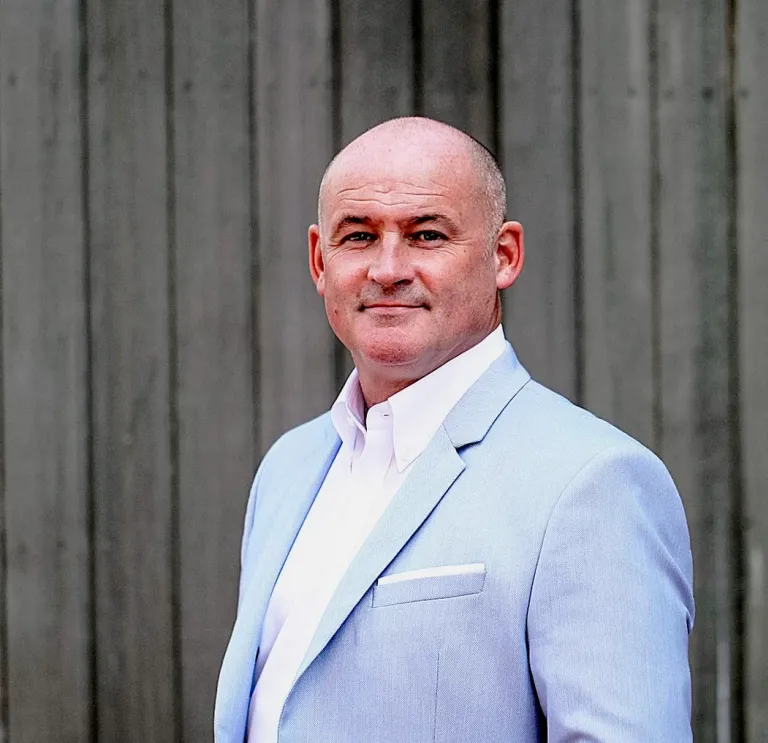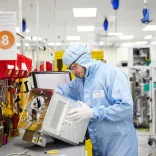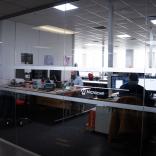Silicon semiconductors were integral to the growth of Silicon Valley, the tech capital of the world that is home to multi-billion dollar companies like Apple, Google, Facebook, and Microsoft. However, in order to enable megatrends of the future – 5G, the Internet of Things (IoT), autonomous and connected transport networks and more – the world needs an alternative to the silicon semiconductor, and one with more powerful capabilities.
Compound semiconductors (CS) are the solution, and crucially Wales is on track to become the centre point of the world’s CS technology market, driven in part by the establishment of the world’s first CS cluster, CSconnected.
In this article, Trade & Invest Wales speaks to Stephen Doran, CEO of the Compound Semiconductor Applications Catapult, a key pillar of CSconnected, about Wales’ role in the development of this technology and the economic opportunities it will bring.
How will compound semiconductors impact technology of the future?
We do not anticipate that CS will replace silicon semiconductors in the near future. Silicon will remain the pre-eminent base technology for future applications. However, the megatrends of the future require a base technology with superior capabilities.
Let’s take 5G technology as an example. 5G is not simply an evolution of 4G and 3G wireless networks; it is a transformative concept. It will bring ultra-fast, ultra-reliable wireless communications to the world – up to 100 times faster than 4G with limited delays – enabling billions of IoT devices. For 5G to become a reality, it requires technology capable of managing extremely fast data transmission, real time sensing and increased power efficiency.
Compound semiconductors, materials formed from two or more elements from the periodic table have the ability to detect and emit light. They are more power efficient than silicon, and therefore can enable new energy efficient solutions. They have lower latency than silicon and are thus ideal for real-time communication applications, such as machine to machine communications in a real world environment. Compound semiconductor based technology provides the upgrade in performance on silicon that is required for future applications such as 5G to become a reality.
What is the economic value of the compound semiconductor industry?
The global CS industry is currently valued at $66 billion, but some analysts predict that this could become over $300 billion by 2030*. We assess that the UK has around a 9% share of this global market. For the UK, the first challenge is to maintain that share as the market grows almost exponentially over the next decade. We can then look to increase our share.
To put this into perspective, just a 1% increase in the UK’s share of the CS industry would be worth an additional £3 billion to the UK economy by 2030.
*Source: Allied Analytics, BCC Research, CSA Catapult estimates
What role does Wales have to play in the compound semiconductor industry and who are the key players?
Wales can be a driving force in the development, manufacture and growth of this industry. The world’s first CS cluster, CSconnected, is based here and has organisations operating at every stage of the supply chain. On the research side, Wales has Cardiff University, Swansea University, the Institute for Compound Semiconductors, and the Compound Semiconductor Centre (a joint venture between IQE plc and Cardiff University). In compound semiconductor wafer production and fabrication, it has IQE plc, and Newport Wafer Fab. SPTS Technologies, which supplies specialist foundry equipment, is headquartered in Newport, and Microsemi provides chip level packaging solutions.
What Wales has is unique. This cluster could create 3,000 to 4,000 highly skilled jobs in technology, with the CSA Catapult aiming to add another 1,000 in the UK through its direct intervention and collaboration with key industry partners. The CSA Catapult is currently recruiting highly skilled candidates to join its team in south Wales. Together, we will play a role in developing the CS market for existing companies in Wales, supporting the growth of new SMEs and attracting established industry players into the area.
How can compound semiconductors attract new businesses to establish a presence in Wales and drive inward investment?
A cluster like CSconnected brings together a world leading academic base, R&D skills and the full end to end supply chain. Organisations coming to Wales to work collaboratively with the cluster would benefit from reduced development cycles, rapid time to production scale and access to the expertise necessary to turn innovative thinking into real products. For a company looking to exploit advanced compound semiconductor technology, having this cluster on its doorstep will be a real competitive advantage.
Where do you see opportunities for the compound semiconductor industry to expand across Wales?
Compound semiconductor technology could have immediate benefits for any number of SMEs or large organisations across industry sectors like automotive, aerospace, communications, energy, and healthcare. Many of those are operating or have the potential to operate in Wales, and could drive growth by either adopting UK developed CS technology or integrating themselves into the wider supply chain. The CSA Catapult is open to working with companies seeking to exploit the potential of CS to drive growth and will collaborate with SMEs and large organisations at its Innovation Centre in Newport.
The development of CS based enabling technology for 5G also presents immense opportunities for Wales. Airbus is one example of a company that is active in 5G technology, and is working as part of a collaborative project to develop in-flight 5G services that could enable online smartphone use in the air. Monmouthshire has been chosen as a 5G testbed for improving rural connectivity.
Are there any other sorts of new applications we can look forward to seeing with the wider adoption of compound semiconductors?
Compound semiconductors will enable vast improvements in the performance and efficiency of electric vehicles. CS will work with new battery technologies to improve this efficiency and could double the range of electric vehicles.
CS technology also enables us to see a broad spectrum of colours through a process called hyperspectral imaging. This can be adopted in healthcare technologies and improve the detection of age-related illnesses, such as cancer, and have a hugely positive impact on societies.
A further example is the fact that CS will be instrumental in the development of artificial intelligence and virtual reality. These technologies will have impacts through a variety of applications. Low latency will be vital to ensuring autonomous vehicles can communicate with each other and respond effectively to keep passengers moving safely. Virtual reality could have a potentially life changing effect as its use in training healthcare professionals becomes more widespread.
Compound semiconductors will form the basis of the world’s future technologies. Wales will be at the heart of their development, and the resulting opportunities for economic growth here are vast.
Stephen Doran is the CEO of the Compound Semiconductor Applications Catapult. For more information visit: https://csa.catapult.org.uk/
*All information within this article was checked and deemed correct at the time of publishing




